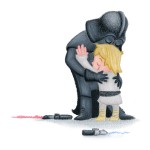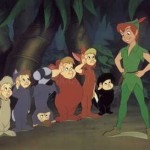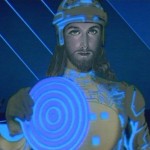 The first time I was given advice about the importance of forgiveness was at the most unlikely of places: an advertising school I was attending in Atlanta. The school had brought in speaker Joey Reiman—a very successful advertising executive who ran his own agency. Almost immediately, I could tell this man had a lot of wisdom, but it was towards the end of his presentation when something he said really resonated with me.
The first time I was given advice about the importance of forgiveness was at the most unlikely of places: an advertising school I was attending in Atlanta. The school had brought in speaker Joey Reiman—a very successful advertising executive who ran his own agency. Almost immediately, I could tell this man had a lot of wisdom, but it was towards the end of his presentation when something he said really resonated with me.
 Disney taught us that, “when you wish upon a star, your dreams come true.” Unfortunately, if your dream is to have both of your parents live to see you succeed, you’re sheer out of luck. In fact, of Disney’s forty full-length animated features from 1937 until 2000, I know of only one where the protagonist’s parents remain alive for the entire film.* Then there’s the fact that just about every super-powered hero is an orphan. If this isn’t bad enough, one or both of the hero’s adoptive parents often dies too! Superman lost his adoptive dad, Spider-Man lost his uncle, and Luke Skywalker lost both his aunt and uncle. With the Amazing Spider-Man movie set for release this summer, and that movie actually exploring the mysterious back-story about Peter Parker’s real parents, I thought it would be a good time to delve into the topic of why so many of our heroes—both super and animated—are orphans, and what the message means for all of us.
Disney taught us that, “when you wish upon a star, your dreams come true.” Unfortunately, if your dream is to have both of your parents live to see you succeed, you’re sheer out of luck. In fact, of Disney’s forty full-length animated features from 1937 until 2000, I know of only one where the protagonist’s parents remain alive for the entire film.* Then there’s the fact that just about every super-powered hero is an orphan. If this isn’t bad enough, one or both of the hero’s adoptive parents often dies too! Superman lost his adoptive dad, Spider-Man lost his uncle, and Luke Skywalker lost both his aunt and uncle. With the Amazing Spider-Man movie set for release this summer, and that movie actually exploring the mysterious back-story about Peter Parker’s real parents, I thought it would be a good time to delve into the topic of why so many of our heroes—both super and animated—are orphans, and what the message means for all of us.
 Anyone who travels within spiritual circles has probably heard about “vibrations.” The context is usually that someone with a higher vibration is somehow more spiritual or that the goal of the individual is to raise his or her vibration. But what does this really mean? Is it all just spiritual mumbo jumbo or is there actually a science behind vibrations? As you probably figured out from the title of this article, I believe that there is absolutely a science to this spiritual concept. And I believe I can prove it.
Anyone who travels within spiritual circles has probably heard about “vibrations.” The context is usually that someone with a higher vibration is somehow more spiritual or that the goal of the individual is to raise his or her vibration. But what does this really mean? Is it all just spiritual mumbo jumbo or is there actually a science behind vibrations? As you probably figured out from the title of this article, I believe that there is absolutely a science to this spiritual concept. And I believe I can prove it.
 In anticipation of TRON: Legacy, I recently re-watched a bunch of simulation-world films including The Thirteenth Floor, eXistenZ, and the original TRON, which I hadn’t seen in over twenty-five years. While I remember being somewhat confused watching the futuristic Disney film as a kid, seeing it again with new eyes, I was amazed at how clearly it expressed the “life as illusion” theme I’ve been so fascinated by as an adult. In the original movie, Jeff Bridges is considered a “user.” While Bridges often plays users in his films, in this case, it refers to a computer user who manipulates the scenarios of a digital world that is very similar to our own. In the original film, users are considered mythical, messianic figures who can help free the programs from the game they find themselves in. This got me thinking.
In anticipation of TRON: Legacy, I recently re-watched a bunch of simulation-world films including The Thirteenth Floor, eXistenZ, and the original TRON, which I hadn’t seen in over twenty-five years. While I remember being somewhat confused watching the futuristic Disney film as a kid, seeing it again with new eyes, I was amazed at how clearly it expressed the “life as illusion” theme I’ve been so fascinated by as an adult. In the original movie, Jeff Bridges is considered a “user.” While Bridges often plays users in his films, in this case, it refers to a computer user who manipulates the scenarios of a digital world that is very similar to our own. In the original film, users are considered mythical, messianic figures who can help free the programs from the game they find themselves in. This got me thinking.
 Just like any story, your life story is filled with twists and turns, an array of interesting characters, moments of bliss and despair, of success and failure, of challenges that will help you grow, and questions that will cause you to wonder. Among the cast of characters there will be love-interests, villains, tricksters, mavericks and mentors. There will be many friends and enemies, and millions of extras. However, there will only be one hero. That hero, is you.
Just like any story, your life story is filled with twists and turns, an array of interesting characters, moments of bliss and despair, of success and failure, of challenges that will help you grow, and questions that will cause you to wonder. Among the cast of characters there will be love-interests, villains, tricksters, mavericks and mentors. There will be many friends and enemies, and millions of extras. However, there will only be one hero. That hero, is you.
 If you’ve read my writings about Lost, you probably know that I believe it’s more than just a show: Lost contains hidden messages about how the world really works. That’s right, I sincerely believe that a TV series is giving us clues that can help us understand the mysteries of life. Well, if that were true, shouldn’t Lost include this little tidbit within its own mythology? Shouldn’t it demonstrate how the media can provide answers to our own life challenges so that we’ll know to look there to find them? Yes, I believe it should, and to be honest, I’ve been wondering if it was ever going to do so. In “Some Like It Hoth,” I finally received my answer.
If you’ve read my writings about Lost, you probably know that I believe it’s more than just a show: Lost contains hidden messages about how the world really works. That’s right, I sincerely believe that a TV series is giving us clues that can help us understand the mysteries of life. Well, if that were true, shouldn’t Lost include this little tidbit within its own mythology? Shouldn’t it demonstrate how the media can provide answers to our own life challenges so that we’ll know to look there to find them? Yes, I believe it should, and to be honest, I’ve been wondering if it was ever going to do so. In “Some Like It Hoth,” I finally received my answer.
 The concept of taking a leap of faith has been covered many times on Lost. Locke had told Jack that he was taking a leap of faith by pressing the button; Hurley took a leap of faith by risking his life with Charlie to get the DHARMA van started as it sped down a hill; and in the episode titled, “316,” the theme shows up throughout. In fact, the title itself should’ve been the first tip-off.
The concept of taking a leap of faith has been covered many times on Lost. Locke had told Jack that he was taking a leap of faith by pressing the button; Hurley took a leap of faith by risking his life with Charlie to get the DHARMA van started as it sped down a hill; and in the episode titled, “316,” the theme shows up throughout. In fact, the title itself should’ve been the first tip-off.
 The first time I was given advice about the importance of forgiveness was at the most unlikely of places: an advertising school I was attending in Atlanta. The school had brought in speaker Joey Reiman—a very successful advertising executive who ran his own agency. Almost immediately, I could tell this man had a lot of wisdom, but it was towards the end of his presentation when something he said really resonated with me.
The first time I was given advice about the importance of forgiveness was at the most unlikely of places: an advertising school I was attending in Atlanta. The school had brought in speaker Joey Reiman—a very successful advertising executive who ran his own agency. Almost immediately, I could tell this man had a lot of wisdom, but it was towards the end of his presentation when something he said really resonated with me.



 If you’ve read my writings about Lost, you probably know that I believe it’s more than just a show: Lost contains hidden messages about how the world really works. That’s right, I sincerely believe that a TV series is giving us clues that can help us understand the mysteries of life. Well, if that were true, shouldn’t Lost include this little tidbit within its own mythology? Shouldn’t it demonstrate how the media can provide answers to our own life challenges so that we’ll know to look there to find them? Yes, I believe it should, and to be honest, I’ve been wondering if it was ever going to do so. In “Some Like It Hoth,” I finally received my answer.
If you’ve read my writings about Lost, you probably know that I believe it’s more than just a show: Lost contains hidden messages about how the world really works. That’s right, I sincerely believe that a TV series is giving us clues that can help us understand the mysteries of life. Well, if that were true, shouldn’t Lost include this little tidbit within its own mythology? Shouldn’t it demonstrate how the media can provide answers to our own life challenges so that we’ll know to look there to find them? Yes, I believe it should, and to be honest, I’ve been wondering if it was ever going to do so. In “Some Like It Hoth,” I finally received my answer. The concept of taking a leap of faith has been covered many times on Lost. Locke had told Jack that he was taking a leap of faith by pressing the button; Hurley took a leap of faith by risking his life with Charlie to get the DHARMA van started as it sped down a hill; and in the episode titled, “316,” the theme shows up throughout. In fact, the title itself should’ve been the first tip-off.
The concept of taking a leap of faith has been covered many times on Lost. Locke had told Jack that he was taking a leap of faith by pressing the button; Hurley took a leap of faith by risking his life with Charlie to get the DHARMA van started as it sped down a hill; and in the episode titled, “316,” the theme shows up throughout. In fact, the title itself should’ve been the first tip-off.
